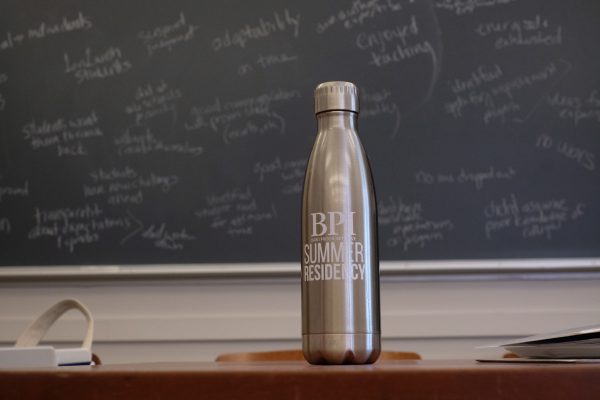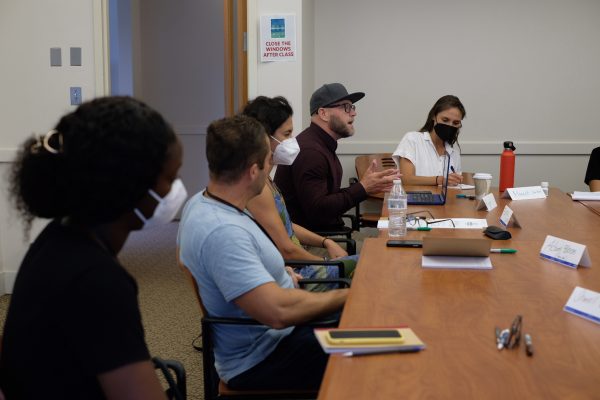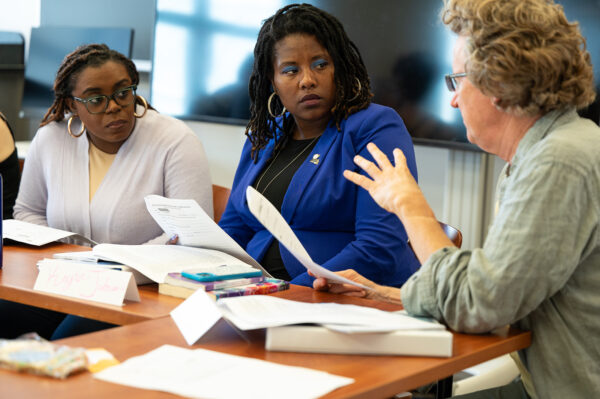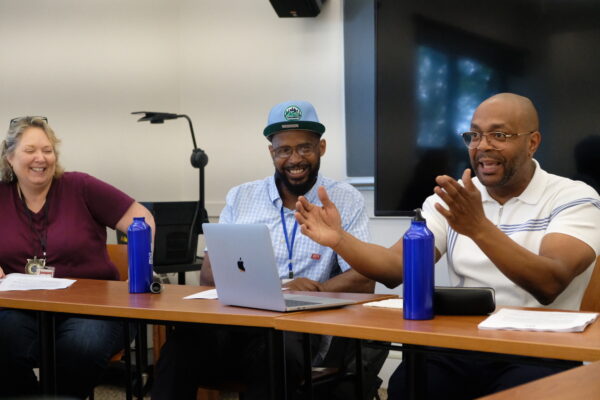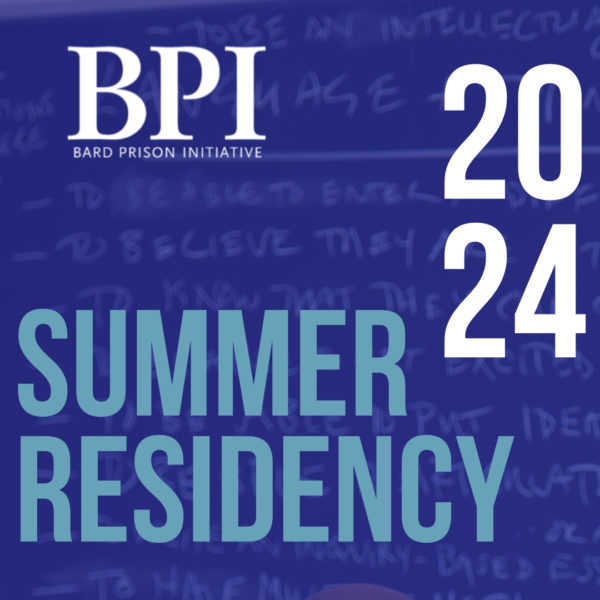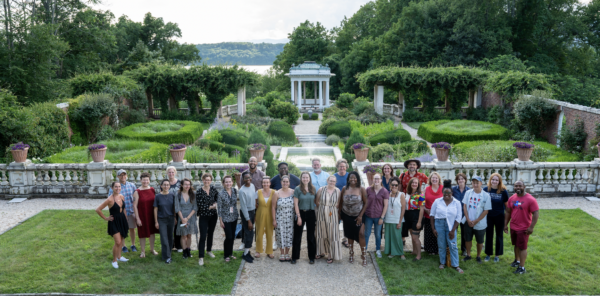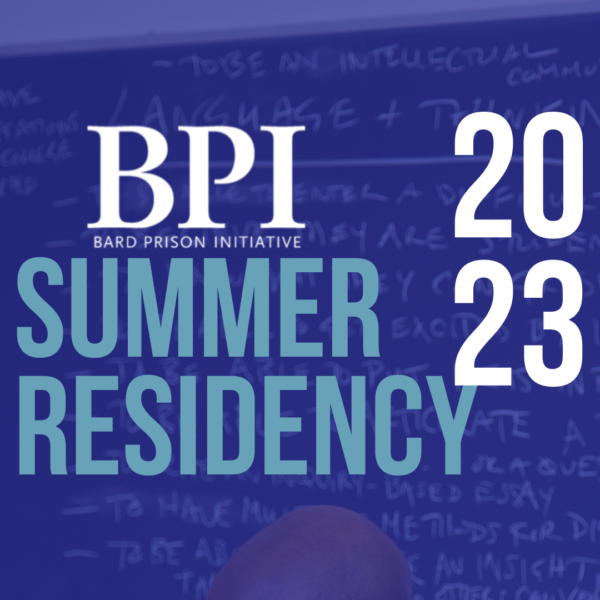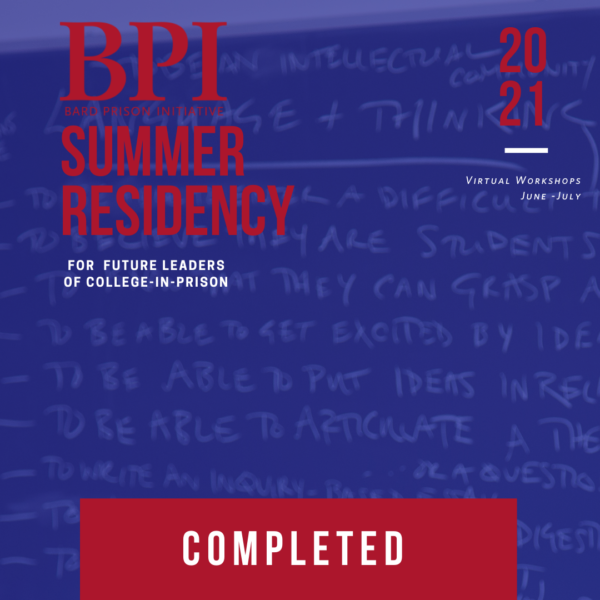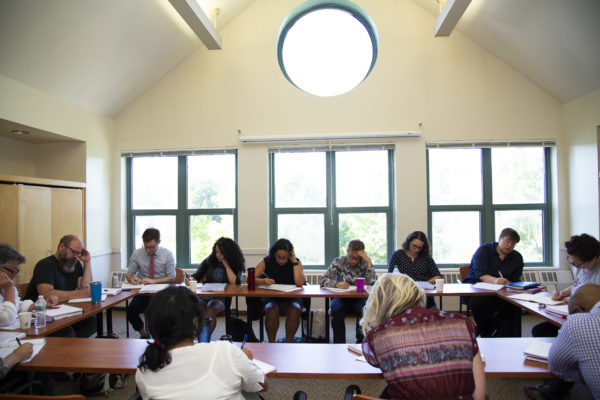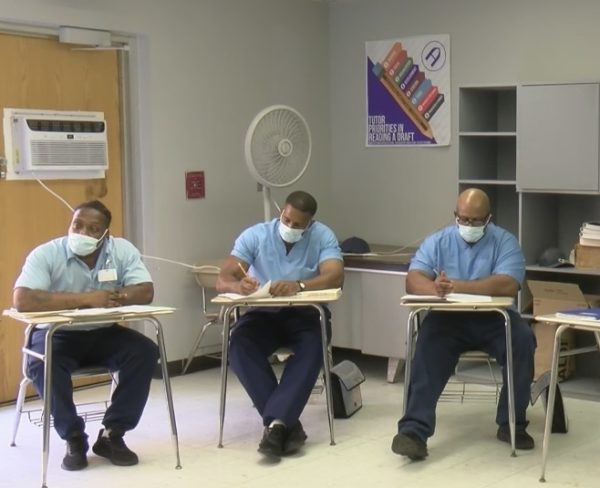Schedule Check here for this year’s schedule. Getting Here For directions and area information, please refer to the Bard College Visitors page, here. The nearest train station is in Rhinecliff. Visit Amtrak for reservations and timetables. On Sunday, July 14th, BPI will provide a shuttle service scheduled to… Read More
The BPI Summer Residency
The 6th Annual Residency will run from July 14th–July 26th, 2024
The BPI Summer Residency is an intensive and immersive two-week sequence of workshops on Bard’s Annandale campus. This hands-on, experiential training in the hows, whys, and whats of BPI’s approach to college-in-prison also includes more technical conversations about the mechanics and strategies of building robust, ambitious, and successful college-in-prison and reentry programs in different locations and institutional contexts. Workshops are led by BPI staff and subject matter experts from across the academic; reentry and alumni affairs; national engagement and advocacy; development; and senior leadership teams.
The Residency is a professional development opportunity structured to encourage residents to build community, compare notes and exchange ideas, and create lasting bonds and a life-long network of support across their cohort, past and future Residency cohorts, BPI staff, and Bard’s Consortium for the Liberal Arts in Prison. These two weeks in-person are followed by webinars, convenings, and other events to facilitate a community of practice across cohorts and programs.
The 2023 cohort pulled from a broad spectrum of emerging leaders in the field of college-in-prison representing public and private institutions, HBCUs, small liberal arts schools, and large research universities as faculty, program directors, newly hired practitioners, graduate students, alumni, and directly impacted people representing thirteen states and five nations.
Each year’s cohort is comprised of educators who engaged in BPI’s program-building technical assistance and consulting in the prior year, along with new staff hires from BPI and across the Consortium for the Liberal Arts in Prison. Room and board and other expenses for the two weeks come at no cost to residents.
ABOVE: BPI Summer Residency at Bard College in Annandale-on-Hudson
2024 Summer Residency Schedule from July 14–26
Workshop Descriptions
Introductions, Welcome, and History
Workshop Leaders: Max Kenner, Jessica Neptune, Delia Mellis
To begin, we will introduce ourselves and take a look at what we’ll be doing in the weeks ahead. We will share a brief history of the field of college-in-prison and the specific story of BPI, and how BPI fits — and doesn’t fit —into the world of higher ed. Together, we will reflect on our hopes and plans for this work: a look at where we’ve each been and where we’re all going.
Paradoxes of College-in-Prison
Workshop Leaders: Megan Callaghan, Madeleine George, Jessica Neptune, Delia Mellis
This workshop engages the rich, necessary contradictions inherent to the endeavor of college-in-prison and how we think about those contradictions in practice.
Bookends of a Student’s Encounter with the College: New Student Orientation and Commencement Planning
Workshop Leaders: Max Kenner, Jessica Neptune
This workshop will explore how we build on the admissions experience to inspire, challenge, and situate students to succeed in the college by inviting students into a long term relationship with the college. Max will conduct an orientation just as we do inside, with participants in the student role.
We will then switch gears and jump to the other bookend of students’ formal time with the college and discuss commencement planning, strategies, and principles and how to reproduce the ceremony in ways that bring the college into the prison and underscore the momentousness of the occasion. Commencement planning stands with student orientation as two core moments in which the program messages the centrality, power, and salience of the college as the relevant institution in student’s lives.
Language and Thinking: Bard’s Introduction to College
Workshop Leaders: Robert Tynes, David Richardson, Rebecca Swanberg
In this session we encounter Bard’s Institute for Writing and Thinking methodology and Bard’s Language and Thinking (L&T) first-year experience. All Bard students begin their first year with this intensive introduction to reading, writing, and thinking for college. It aims to disrupt their expectations and reorient their thinking about what it’s like to do rigorous, collaborative intellectual work. We will learn by doing, going through a quick but intense version of a day in L&T so that participants can get a sense of what the workshop makes possible.
Academic Overview and Writing Curriculum
Workshop Leaders: Amy Cox Hall, Delia Mellis, Jeffrey Jurgens
This session will detail the specifics of the BPI curriculum, its goals and reasoning — including relationship to main campus requirements and approach, with an eye toward applying some core principles to curricular development at your own college. In doing so we will elaborate upon the L&T experience and how it leads into Bard’s writing-based process.
Planning for Degrees and Majors
Workshop Leaders: Delia Mellis, Jessica Neptune
Beginning by reflecting on your home institution’s degree requirements and the hallmarks of its undergraduate experience, we will discuss strategies for applying core principles to curricular development at your own college. We will also think together about how to build stackable credentials between AA and BA degrees, choose majors to offer, and think through the problem of replicating main campus degree requirements and the depth and breadth of main campus course offerings at a very different scale in prison.
Faculty Recruitment and Hiring
Workshop Leaders: Megan Callaghan and Amy Cox Hall
Sharing strategies for identifying good candidates, spotting dangers, and bringing faculty into the work.
Faculty Orientation
Workshop Leaders: Megan Callaghan and Amy Cox Hall
What information is most important for faculty to have prior to the start of a semester? What kind of support is most helpful throughout? We invite workshop participants to build components of their own faculty handbooks, consider strategies for effective faculty communication before and during a semester, and reflect on challenges and successes of teaching and of supporting faculty.
Academic Resources I: Advising, Research Support and Libraries
Workshop Leaders: Andres Pletch, Delia Mellis, Hannah Henry
Academic Resources support students outside the classroom in responding to the myriad challenges of college work — conceptual, logistical, personal, and professional.
- BPI students rely on research support directed by a professor on staff who manages a team of work-study students who find and print out materials for them in response to requests that may be as specific as an article citation derived from the JSTOR index, or as broad as a general request for information on the Cultural Revolution in China.*
At every BPI site there is a college library, which may be comprised of several bookcases inside the college classroom or could be an entire room full of shelves, with study tables and a whiteboard on wheels. How do we build, organize, and protect the library? Who is responsible for it?
Academic Resources II: Academic Advising & Peer Tutoring
Workshop Leaders: Hannah Henry, Delia Mellis, Claire Lindsay
Academic Resources support students outside the classroom in responding to the myriad challenges of college work — conceptual, logistical, personal, and professional.
- Academic advising focuses on helping students navigate their trajectory through the college, from course selection to complicated conversations with faculty; strategizing with them around academic challenges, both intellectual and logistical; and staying focused through the conflicts that can arise between student life and everything else.
Peer tutoring is central to the BPI experience. Like their counterparts on the main campus, students inside may take a for-credit course to learn basic principles and practices of effective, student-centered pedagogy. Those who go on to become writing and math tutors are a crucial force in the collaborative learning ethos and practice that define the college community inside. This community extends to include undergraduates from the main campus, similarly trained through the college’s Learning Commons, who come in weekly to the prisons. This session situates the hows and whys of tutoring within the big picture of the college inside. In addition to hearing from those who train and manage both categories of tutors (those inside and those coming in from outside), we will talk with alum who have worked as tutors about the ways in which tutoring figured in their own educational trajectory.
Thinking about Fundraising
Workshop Leaders: Kate Cox
The first in a series of conversations with BPI’s development team, this workshop lays the groundwork for shaping your program’s philosophical approach to fundraising. We will discuss how to get comfortable asking for money and explore our assumptions and challenges related to fundraising.
Grant Writing and Fundraising Development Strategies and Planning
Workshop Leaders: Sayra Havranek and Kate Cox
Conversations with BPI’s development team continue in this session as we explore strategies for how to plan fundraising that includes grant writing, cultivating small donors, and development communications strategieson an annual basis. The team will share insights and guidance related to the nuts and bolts for building out the vision, capacity, and infrastructure to seek out, obtain, and retain support from donors and foundations.
Planning for Pell
Workshop Leaders: Megan Callaghan and Rupali Rifenburg
In this session we will explore the new Pell PEP regulations and steps required to apply to become a PEP eligible site and moving from Second Chance Pell into becoming a PEP. We will discuss how to work with students for the successful completion of the FAFSA, as well as how to approach the question of tuition and student accounts with the college administration. This year BPI Dean Megan Callaghan and Director of Budget and Financial Aid Rupali Rifenburg will be joined by fellow member of the cohort, Sheila Meiman of the National Association of Student Financial Aid Administrators.
Data and Filemaker
Workshop Leaders: Megan Callaghan, Hannah Henry, Elizabeth Todd
In this workshop we will explore BPI’s Filemaker system as a tool for day to day program management as well as for data collection, reporting and program evaluation: What to track and why and how. We will explore what to consider when building out a database, categories and definitions for data collection and reporting, and some principles in thinking about the boundaries and ethics of research in the field of college in prison.
Introduction to BPI Admissions and Essay Reading
Workshop Leaders: Natalia Guzman Solano
Admissions is the first encounter with the college; we engage with prospective students exactly as we do those who are enrolled —- with respect, rigor, and deep interest. The admissions process crystallizes the BPI model; in this session we will explore both process and philosophy.
We will spend time reading and scoring admissions essays so that participants gain a hands on experience with the BPI method. What are we looking at, what are we looking for, and how do we decide who gets an interview?
Admissions Interviews: Philosophy and Practice
Workshop Leaders: Natalia Guzman Solano
In this workshop we will explore the art of the admissions interview, watching and then practicing together how to engage with prospective students so that they show us what kind of student they could be, and how we show them something about what it would be like to be a student at Bard.
Dinner and Conversation with Site Directors
Workshop Leaders: Robert Tynes, Pamela Wallace, Amanda Vladick, Zach Schwartz-Weinstein, David Richardson, Rebecca Swanberg, Jesse Miller, Claire Lindsay, Hannah Henry, Julia Herion-Cruz, Ana Grujic, Brianna Estrada, Sam Grabowski-Clark
The daily work of sustaining the college inside: supporting students, communicating with prison staff, and managing faculty. Site directors share stories and strategies for creating possibilities and responding to the challenges that arise every day.
Cultivating College Community Inside: A Conversation with Alumni
Workshop Leaders: Shawn Young, Patrick Bannon, Shahein Clay, Aisha Ndiaye
While site directors, faculty, and other college representatives work to find, hold, and extend space for the college within the prison, we know that it is students who create and sustain the world of the college inside. We will talk with alum about what students do to build community and protect the college under challenging circumstances, and how we can best support them in doing so.
Community Wellness
Workshop Leaders: Delia Mellis, Madeleine George, Vanessa Estime
This workshop explores some strategies for acknowledging, coping with, and building resilience in the face of our students’ historical and ongoing traumatic experiences. How do we support their well-being and our own?
Working with Corrections
Workshop Leaders: Megan Callaghan, Robert Tynes, Jessica Neptune
This conversation will cover tips and strategies for negotiation with the DOC. What does the college need from the DOC? What to consider in an MOU? How to navigate central office and facility level leadership. Taking up space in the prison. Classification and movement. Recruitment of future students. Defining what’s “college business.”
Alumni Careers and Dinner
Workshop Leader: Dyjuan Tatro, Nikko Vaughn, James Kim, Shawn Young
Join in a conversation with BPI alumni who work on the BPI team in various capacities including portfolios that cover: government affairs and advocacy, reentry and housing, continuing education, working with young people in the juvenile system, and directing a Microcollege.
Conversation between Jessica Neptune ’02 and Patrick Stephens ’17 about the History of Incarceration and Restorative Justice
Workshop Leader: Jessica Neptune, Patrick Stephens
Join Jessica Neptune and Patrick Stephens for dinner and a conversation as we pause our focus on practice to zoom back out and critically engage the imagined purpose and function of prisons over time. Jessica will explore the long history of the institution of the prison, cycles of failed reforms, and the idea of rehabilitation before Patrick turns to his work in restorative justice.
Reentry: Getting Started
Workshop Leaders: Shawn Young, Jed Tucker, Hannah White
We will experience BPI’s introduction to reentry and learn about the history of reentry at BPI and thoughts about how to get started in offering reentry support in your program. We will also look at BPI’s reentry workshops inside: what do students need most as they prepare to leave prison and what can we provide? How do we guide them toward resources? We will build connections between BPI’s reentry work on the inside and the BPI ConnectED Workshop.
Beyond Reentry, Building out Alumni Support and the ConnectED Workshop
Workshop Leaders: Nikko Vaughn, Shawn Young, Sylvester Reddick, Sonia Padilla
Alumni staff leaders of BPI’s ConnectED Workshop lead us through a session and then describe the content and experience of the six-week workshop for recently released alumni/ae, which covers housing, continuing education, engaging with technology, wellness, career development, and navigating social services.
BPI holds fifth annual Summer Residency
BPI held its fifth annual Summer Residency this July, hosting more than 20 practitioners along with new BPI staff for an intensive and immersive two-week sequence of 25 workshops on Bard’s Annandale campus. "The cultivation of a community of practice, and meanwhile an infusion of… Read More
BPI Summer Residency 2023: What to Know Before You Arrive
Schedule Check here for last year’s schedule as a close schedule for the one that is to come for the 2023 year. Getting Here For directions and area information, please refer to the Bard College Visitors page, here. The nearest train station is in Rhinecliff. Visit Amtrak… Read More
BPI Completes Fourth Annual Summer Residency
The BPI Summer Residency is a professional development opportunity that provides hands-on, experiential training in the hows, whys, and whats of BPI’s approach to college-in-prison. This July, emerging college-in-prison educators and practitioners from California, Oregon, Virginia, Massachusetts, Connecticut, Missouri, New York, and Hawai’i as well… Read More
Third Annual BPI Summer Residency
It's a wrap! BPI's third Summer Residency has come to a close after three intensive weeks of workshops. The BPI Summer Residency is an intensive cohort-based sequence that takes residents under the hood for hands-on and experiential workshops that explore the hows, whys, and… Read More
Summer Residency 2020
Today we closed out our second annual BPI summer residency. This year's gathering was all virtual with members of BPI's Consortium For the Liberal Arts in Prison joining BPI staff on Zoom for two rich weeks packed with workshops on the nuts and bolts… Read More
Augustana College joins the Consortium for the Liberal Arts in Prison
Earlier this year, BPI proudly announced its newest member of the Consortium for the Liberal Arts in Prison: the Augustana Prison Education Program (APEP). BPI launched the Consortium in 2009 to facilitate the further establishment of college-in-prison nationwide. The Consortium currently represents fourteen colleges… Read More
Boston College Launches New Prison Education Program
Boston College is on board! The Boston College Prison Education Program (BCPEP) recently launched and joined the Consortium for the Liberal Arts in Prison. With the support of BPI and friends of the University, BCPEP has launched a college-in-prison program within MCI-Shirley. The first… Read More


